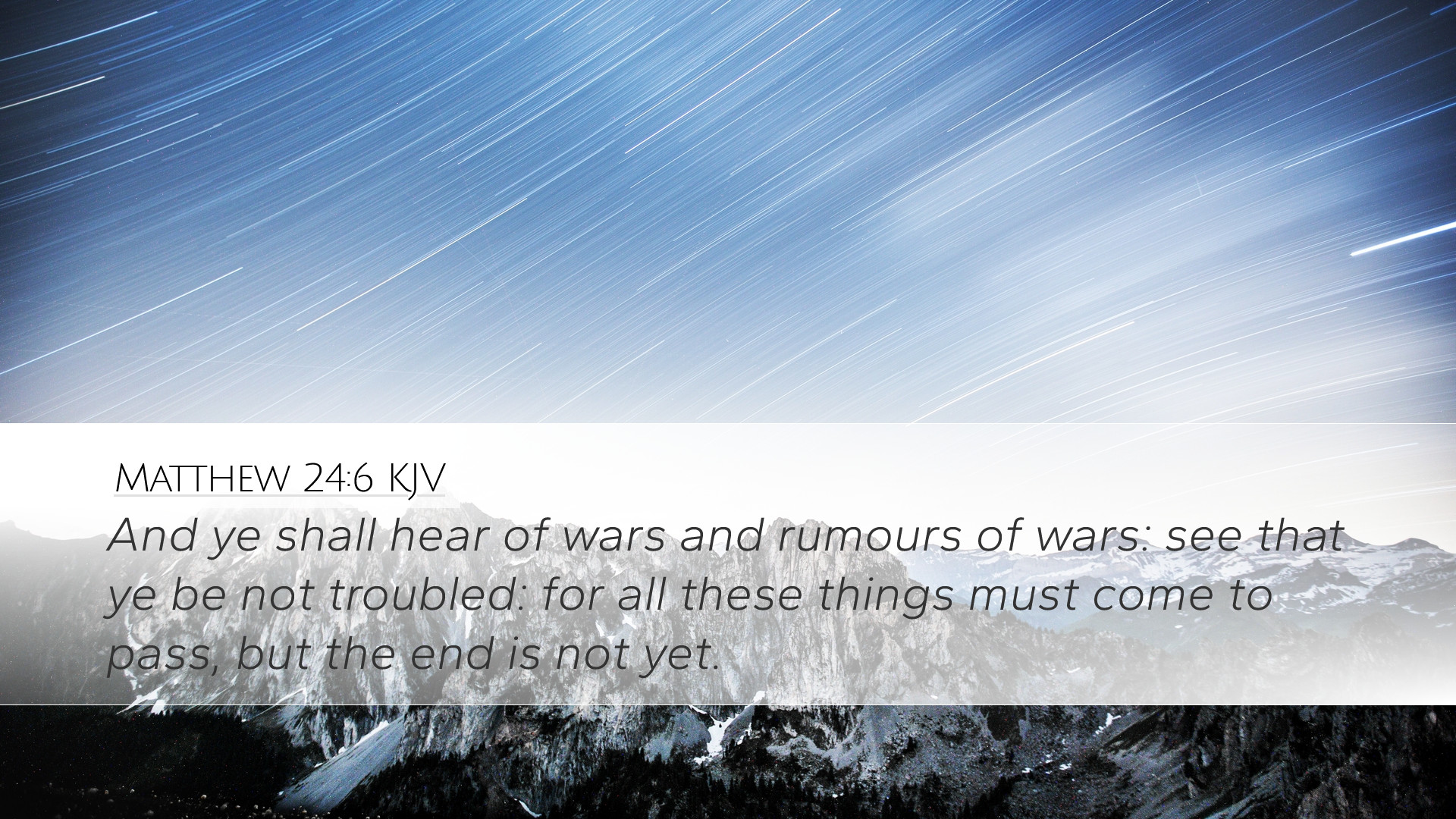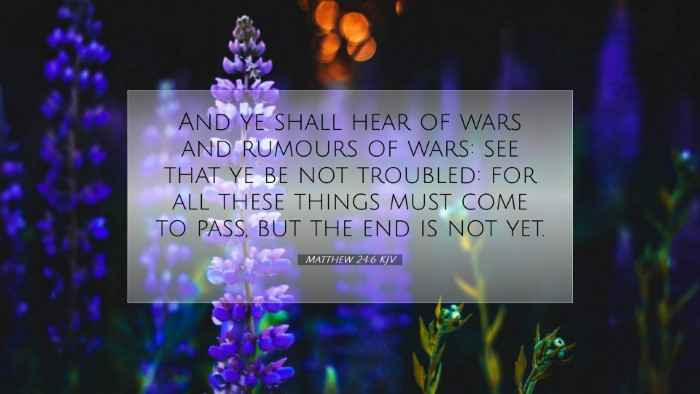Commentary on Matthew 24:6
Verse: "And ye shall hear of wars and rumors of wars: see that ye be not troubled: for all these things must come to pass, but the end is not yet." (Matthew 24:6)
Introduction
This profound verse from Matthew’s Gospel speaks to the heart of Jesus' teaching on the signs of the times leading to His second coming. In this commentary, we will explore its implications through the lenses of historical context, theological significance, and practical applications in the life of believers.
Historical Context
Matthew 24 is often referred to as the Olivet Discourse, where Jesus addresses His disciples about the future and the signs that will precede His return. The verse portrays a chaotic world filled with wars and rumors of wars. This serves as a reassurance of God’s sovereignty over history while also providing a warning to His followers.
Matthew Henry's Perspective
Henry emphasizes that these conditions—wars and unrest—are part of the natural birth pangs that precede Christ's return. He interprets the phrase 'rumors of wars' as indicative of the fears and anxieties that pervade humanity, often reflecting a lack of faith. Henry brings forth that such turmoil should not shake a believer’s confidence, for they are part of the divine prophecy set forth by God.
Albert Barnes' Insights
Barnes highlights the significance of the phrase "see that ye be not troubled." He underscores the importance of faith amidst external chaos. The presence of conflicts can lead to despair; however, Jesus instructs His followers to maintain peace and assurance. Barnes points out that historically, these wars are indicative of the spiritual battle that Christians must wage against sin, emphasizing vigilance and steadfastness in faith.
Adam Clarke's Analysis
Clarke expands on the interpretation of 'wars and rumors of wars,' suggesting that such disturbances in the world are not exclusive to the time of Christ but are a continual reality in human history. He points out that these occurrences are part of God's divine plan and serve as a reminder for believers to remain watchful. Clarke's exegesis draws attention to the historical instances of conflict that serve as lessons for contemporary faith journeys.
Theological Significance
The verse ultimately speaks to the sovereignty of God in the midst of human strife. The emphasis is on the fact that such turmoil is not an indication of God’s absence but rather a sign of the unfolding of His redemptive plan. The mention of 'the end is not yet' opens a dialogue about matter of eschatology, emphasizing that the culmination of human history is in God’s hands and cannot be prematurely accelerated by human actions or conflicts.
- Divine Sovereignty: God remains in control even during chaotic times.
- Assurance of Faith: Believers are called to maintain peace in the midst of trouble.
- Expectation of Christ's Return: Such signs reinforce the anticipation of the Kingdom of God.
Practical Applications
For pastors, students, theologians, and scholars, this passage offers a rich foundation for understanding the interplay between faith and the reality of suffering. There are several practical implications for their ministry and study:
- Encouragement in Troubling Times: Leaders can draw from this passage to remind their congregations of God's peace amidst turmoil.
- Teaching on Eschatology: The chapter serves as a basis for understanding the importance of being prepared for Christ's return.
- Focus on Spiritual Warfare: The mention of wars can be expanded metaphorically to discuss the spiritual battles Christians face daily.
- Promoting Hope: The assurance that "the end is not yet" empowers believers to hope and work for justice and peace.
Conclusion
Matthew 24:6 serves as a profound reminder of the spiritual realities that accompany the physical manifestations of war and chaos. As believers navigate the complexities of life, they are called to maintain their faith and reflect the peace of Christ in a troubled world. Drawing from the insights of esteemed commentators like Matthew Henry, Albert Barnes, and Adam Clarke enriches the understanding of this text, offering layers of meaning that can enhance preaching, teaching, and personal reflection.


